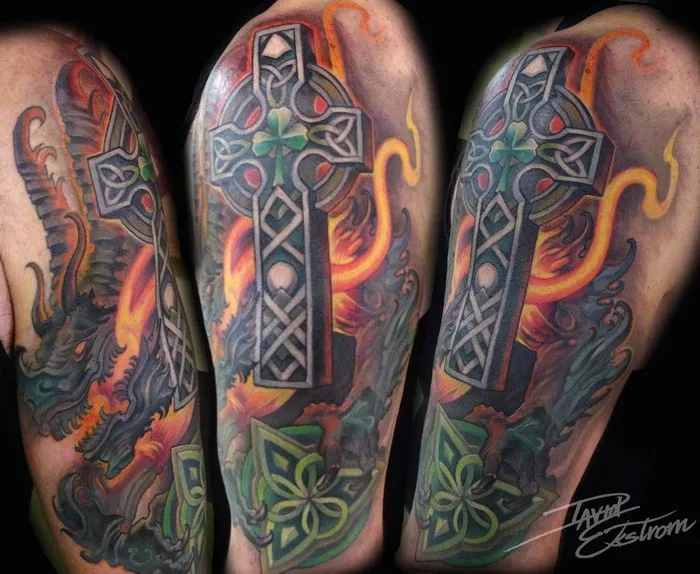Cultural appropriation has become a significant topic of discussion in recent years, particularly in the realm of art and fashion. As people become more aware of the implications of borrowing elements from other cultures, questions arise about the ethics behind certain practices. One area where this debate often surfaces is in the realm of tattoos, with Celtic tattoos being a prime example. Celtic symbols and designs have a rich cultural history, but when people from outside Celtic cultures choose to get these tattoos, it raises questions about respect, understanding, and the appropriation of cultural heritage.
Understanding Celtic Culture and Symbols
Before delving into the debate surrounding Celtic tattoos and cultural appropriation, it’s essential to understand the significance of Celtic culture and its symbols. The Celts were an ancient group of peoples who inhabited parts of Europe, including Ireland, Scotland, Wales, and parts of France and Spain. They had a rich and complex culture, characterized by their art, language, and mythology.
Celtic symbols are intricate and meaningful, often representing concepts like strength, unity, and the cycles of nature. Some of the most well-known Celtic symbols include the Celtic knot, the triskele, and the Celtic cross. These symbols were used in various contexts, including religious rituals, art, and ornamentation.
Cultural Appropriation: What It Is and Why It Matters
Cultural appropriation occurs when elements of one culture are adopted by members of another culture without proper understanding, respect, or acknowledgment. This can take many forms, from wearing traditional clothing as a fashion statement to using sacred symbols in a superficial or disrespectful manner. Cultural appropriation is problematic because it can perpetuate stereotypes, marginalize already oppressed groups, and erase the significance of cultural practices and symbols.
In the context of tattoos, cultural appropriation often occurs when people choose designs that hold deep cultural or spiritual significance without understanding the history or meaning behind them. This can be particularly sensitive when it comes to indigenous or minority cultures that have been historically marginalized or oppressed.
The Debate Over Celtic Tattoos
The question of whether Celtic tattoos constitute cultural appropriation is a complex and nuanced one. On one hand, Celtic symbols are often admired for their beauty and intricacy, and many people who get Celtic tattoos do so out of a genuine appreciation for the culture. Additionally, Celtic culture is not extinct but rather a living tradition, with people of Celtic heritage still actively preserving and celebrating their traditions.
However, it’s essential to recognize that Celtic symbols hold deep meaning for many people who are part of Celtic cultures. These symbols are not merely aesthetic; they are imbued with centuries of history, mythology, and spiritual significance. When people from outside Celtic cultures get these tattoos without understanding or respecting their cultural context, it can be seen as a form of appropriation.
Respectful Tattooing Practices
So, how can individuals navigate the complex terrain of cultural appropriation when it comes to getting tattoos? The key lies in education, respect, and thoughtful consideration.
First and foremost, anyone considering a tattoo with cultural significance should take the time to learn about the culture from which it originates. This means understanding the history, symbolism, and cultural context behind the design. It also means engaging respectfully with members of that culture and seeking their input and perspective.
Secondly, it’s essential to approach the tattooing process with reverence and respect. This means working with a tattoo artist who is knowledgeable about the cultural significance of the design and who can ensure that it is executed with care and precision. It also means being mindful of how the tattoo will be perceived by others and being prepared to explain its significance if asked.
Finally, it’s important to recognize that getting a tattoo is a deeply personal decision, and individuals should ultimately follow their own instincts and beliefs. However, this should not preclude them from considering the broader cultural implications of their choices and striving to be respectful and mindful in their actions.
Conclusion
In conclusion, the question of whether Celtic tattoos constitute cultural appropriation is a complex and multifaceted one. While Celtic symbols are admired by many for their beauty and symbolism, it’s essential to recognize that they hold deep cultural significance for people of Celtic heritage. When individuals from outside Celtic cultures choose to get these tattoos, they should do so with an understanding of and respect for the cultural context from which they originate.
By educating themselves, approaching the tattooing process with reverence, and being mindful of the broader cultural implications of their choices, individuals can ensure that their tattoos are a celebration of cultural diversity rather than a form of appropriation. Ultimately, the goal should be to honor and respect the cultures from which these symbols originate while also expressing one’s own identity and values through the art of tattooing.

